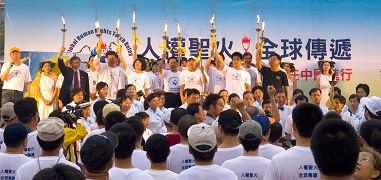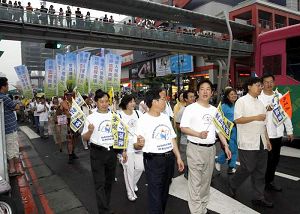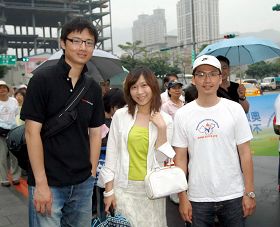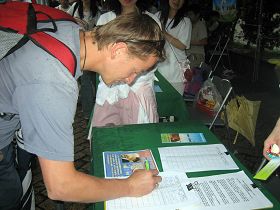(Clearwisdom.net) The Human Rights Torch Relay (HRTR), initiated by the Coalition to Investigate the Persecution of Falun Gong (CIPFG), arrived in Taiwan on June 1, 2008. At 4 p.m., Huang Xiaomin, silver medal winner of the women's 200m breast stroke in the 1988 Olympics, held the Torch and started the relay from the Presidential Palace in Taipei. Ms. Huang and many other runners passed through the busiest areas in town and finished the relay in front of the Taipei City Hall.
The welcoming ceremony for the Torch first observed a moment of silence for the victims of the recent Sichuan earthquake and for those who have died under the Chinese Communist Party's campaigns of persecution.
Lai Ching-Te, President of CIPFG Asia and currently a legislator, spoke at the ceremony to welcome the arrival of the Torch, which has been to 34 countries and over 100 cities, and thanked all the relay participants.
|
|
|
|
Lai told the reporter that the Chinese Communist Party (CCP) had the worst human rights record in the world, but the world overlooks that fact because of China's economic potential. The CCP persecutes Falun Gong and profits from illegal sales of practitioners' organs. The CCP refused to let the CIPFG to enter China to investigate the persecution of Falun Gong and refused to improve its human rights record. Lai opposed the 2008 Olympics being held in Beijing and hoped that the international community will pay attention to China's human rights situation through such an activity.
Lai also mentioned the CCP's recent attack on Falun Gong practitioners in Flushing, NY, which was an attempt to frame and slander Falun Gong to distract the international community's focus on its human rights atrocities.
Legislator Tu Shing-Che, a member of CIPFG, used to be a medical doctor and Chief of the Health Department at the Executive Yuan. Tu said it was unacceptable to transplant or sell organs from unwilling donors. Tu stressed that it was inhumane and definitely not an acceptable medical practice.
Tu said, "It is ridiculous that the persecution [of Falun Gong] will be happening at the same time and in the same place with the Olympic Games. After the earthquake in Sichuan, while the world is helping to relieve the disaster, the CCP is using the catastrophe to instigate hatred to persecute dissidents." Through the activity of HRTR, Tu wants to tell the world that "human rights is a universal value that should be promoted by the Olympics."
Chang Ching-Hsi, President of the Falun Dafa Association in Taiwan, said that he was saddened that the CCP used the Olympics as an excuse to rationalize the suppression of human rights.
William Kao, organizer of the Victims of Investment in China Association; Khedroob Thondup, Member of Parliament of Central Tibetan Administration; and Sun Yo-Lien, spokesperson of Taiwan Free Burma Network gave speeches at the torch hand-over ceremony.
Tsai ran in the torch relay. Before that, he said that the CCP trampled upon human rights by suppressing Falun Gong practitioners and Tibetans. He believed it was meaningful for an activity such as the torch relay to support human rights in China.
Chen, who also ran with the torch, said that he decided to join the activity the minute he learned that the Torch was coming to Taiwan. He wanted to do something for an activity that safeguarded human rights. He wished that more people could participate and learn about the CCP's persecution of kind people.
Chiang Chuan-Chi, a non-practitioner, has been teaching orchestral music for over 20 years. He was in charge of teaching members of the Divine Land Marching Band about musical performance. "When I learned that the torch was coming to Taiwan, I decided to come. Human rights is a universal value. Everyone deserves to have basic rights, democracy, freedom and peace. There shouldn't be any persecution," said Chiang.
Ms. Chan is a Ph.D. student. "I came here with a friend to join the parade and support the arrival of the human rights torch. Through many people's support, I hope the world's people can understand how the CCP persecutes human rights and rethink whether the Chinese regime is qualified to hold the Olympics, which symbolize peace," said Chan.
Chang is a student from National Taiwan University of Art. He said, "I subscribe to The Epoch Times. I learned about the activity from the newspaper's website and invited my girlfriend to come." "I don't feel tired from all the walking; it's so meaningful. I saw that many people from Taiwan joined this parade, and I learned how the CCP suppressed human rights before the Olympics. People from many other countries supported the torch relay as well and worked together to protest the CCP's persecution of human rights."
|
|
The torch arrived at the Taipei City Hall at five o'clock. Huang handed the Torch to Peng Wei-Yau, former national champion bodybuilder, and Chiu Shiao-Jun, former national martial arts champion, in a simple ceremony. The Divine Land Marching Band then led the participants in marching around City Hall.
The torch's next stop will be Kee-lung City. It will go around Taiwan clockwise and visit 23 cities and counties. The torch's last stop in Taiwan is Taipei County and after that it will be delivered to Japan.
Category: April 25 Events












